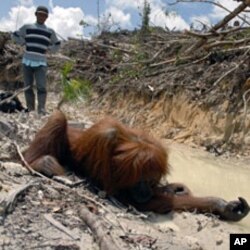Just a week after the last known Javan rhino was reported dead in Vietnam, a new study shows that orangutan hunting is on the rise in one of that animal's last refuges, the Borneo region of Kalimantan. With swathes of forests being cleared for industry, the endangered primates are entering villages and plantations for food - leading villagers to kill them as pests or to eat them.
The conversion of Kalimantan’s forests into concessions for logging, pulp and paper and mining has long been a threat to the survival of the orangutan. But it is not the only one.
Dr. Erik Meijaard is the chief scientist behind the survey conducted by The Nature Conservancy, an environmental advocacy group. He says that shrinking forests go hand in hand with the mounting slaughter of endangered orangutans by local communities.
Dr. Meijard says bushmeat is part of the local lifestyle, so even if hunters are not looking for orangutans, they will eat them when they catch them.
“A lot of people like orangutan meat. I mean, people describe it as a sweet meat that has a good taste apparently. So I think that once people do have an orangutan they are quite happy to eat it… The average hunter in Borneo will be targeting pigs and deer. They are the biggest animals with the most meat. But sometimes if you don't get anything and you can catch an orangutan you'll take it.”
Conducted in more than 600 villages in Kalimantan, the survey showed that orangutans are sometimes deliberately targetted.
Local villagers told the researchers that oil palm companies have paid them to eradicate the endangered animals. The companies see them as pests, explains Dr. Damayanti, a lecturer in Ecology at the Agriculture Institute in Bogor who was involved in the study.
“The are instances when the community can get money if they kill orangutan because companies who see orangutan as a threat really want to decrease the population of orangutan," said Damayanti. "So if people can present some remnants of orangutan body parts, they can get money out of it. ... There is an incentive although of course none of the companies would acknowledge that, but when you go and talk to the local people then yeah.”
Dr Meijaard, says that at least two interviewees admitted to killing some 150 orangutans between them in return for money from an oil palm company.
The survey was focused on gauging community attitudes rather than determining exactly how many orangutans are left. But the researchers concluded that even if all forests are protected from now on, orangutans will be wiped out if the hunting is not adequately addressed.
President Susilo Bambang Yudhoyono has announced a national action plan to protect orangutans, but environmentalists like Dr. Meijaard say more is needed, including targeted campaigns to increase public awareness and moves to reduce corruption in the forestry and mining industries.
"There has to be a way that we as Indonesians will live together with these animals, accept them as being part of our environment and get some message out there that gets people to think about it and it has to go hand in hand with law enforcement. People should become aware that killing orangutans is just not an option anymore," said Meijaard.
Orangutans once thrived across Southeast Asia, but today they are found only in the rainforests of Sumatra and Borneo. In the province of Kalimantan, there are an estimated 50,000 orangutans.


